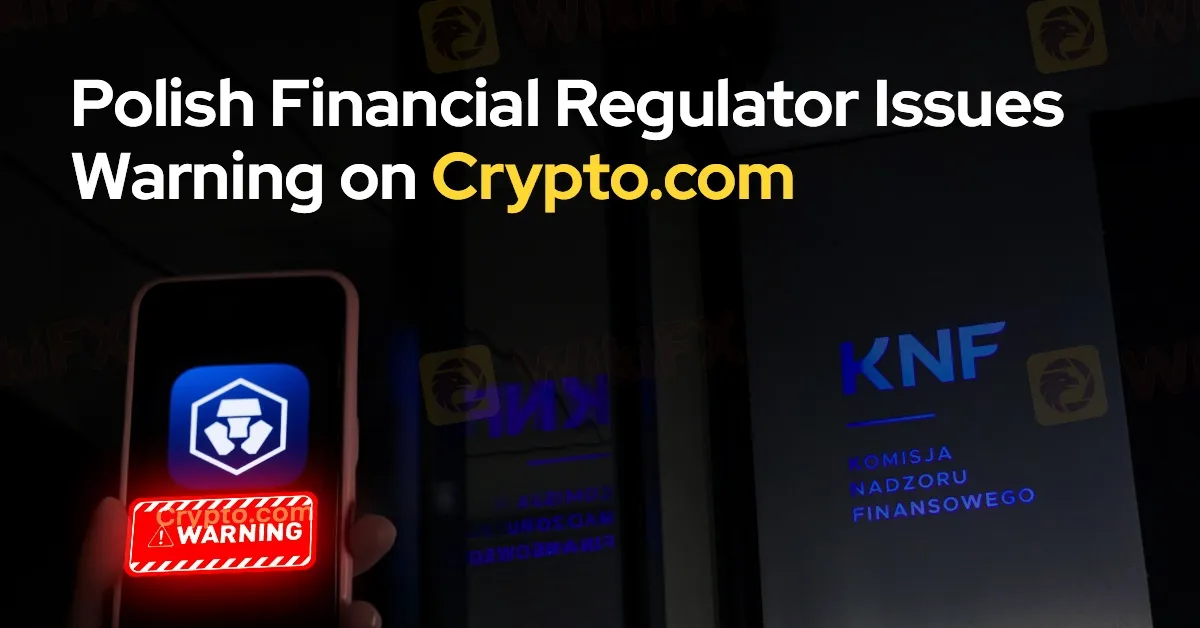简体中文
繁體中文
English
Pусский
日本語
ภาษาไทย
Tiếng Việt
Bahasa Indonesia
Español
हिन्दी
Filippiiniläinen
Français
Deutsch
Português
Türkçe
한국어
العربية
Polish Financial Regulator Issues Warning on Crypto.com
Abstract:The Polish Financial Supervision Authority (KNF) has recently issued a cautionary warning regarding Foris DAX MT, the Malta-based entity operating under the Crypto.com brand

The Polish Financial Supervision Authority (KNF) has recently issued a cautionary warning regarding Foris DAX MT, the Malta-based entity operating under the Crypto.com brand. This alert, though not an outright ban, aims to inform Polish investors of potential risks linked to Crypto.com's operations in Poland, emphasising the need for due diligence when engaging with foreign crypto platforms.
Under Polish law, companies that provide brokerage or investment services within Poland are required to hold proper licenses. According to Article 178 of the Act on Trading in Financial Instruments, these licenses are essential for regulatory compliance. The KNF flagged Foris DAX MT for potentially breaching these licensing requirements and has referred the matter to the Warsaw Regional Prosecutors Office for further examination.

Currently, Crypto.com is not on the KNF‘s blacklist, which would signify outright prohibition. However, the warning serves as an alert for Polish citizens about potential unauthorised financial activities from the company. The KNF’s public warning list, which includes 413 institutions as of now, primarily aims to protect consumers from firms suspected of engaging in unlicensed financial services. Crypto.com, as the largest entity on this list, is under scrutiny, though the final course of action will depend on the Prosecutor‘s Office’s review.
In response to the KNF‘s alert, a spokesperson for Crypto.com clarified that the company is actively working with legal advisors to address the regulator’s concerns and ensure compliance. Tomek Kolodziejczuk, a Bitcoin advocate in Poland, noted that the warning does not signify a ban but is an essential reminder for investors to stay aware of regulatory statuses when engaging with crypto platforms.
The scrutiny from Polands financial regulator aligns with broader efforts to oversee cryptocurrency activities without outright prohibition. Although Poland has not banned virtual assets, the KNF remains cautious and encourages a balanced regulatory approach, similar to other nations. The regulator frequently advises consumers to exercise caution, given the high volatility, complex nature, and lack of robust consumer protections within many cryptocurrency markets.
KNF officials have consistently warned potential crypto investors that trading in digital assets carries substantial risk, including the possibility of total financial loss. The regulator emphasises that while crypto trading is legal within Poland, it lacks the extensive consumer protection measures typically found in traditional financial products. The KNF's stance aims to educate the public on the inherent risks and volatility associated with cryptocurrencies, as well as to mitigate the possibility of misuse or financial crime within the industry.
Meanwhile, on the international front, Crypto.com CEO Kris Marszalek recently announced a lawsuit against the U.S. Securities and Exchange Commission (SEC), accusing the regulatory body of overreach, which he claims has negatively impacted millions of crypto holders in the United States. The move highlights the challenges cryptocurrency firms face in navigating various national regulatory landscapes, as crypto regulations continue to evolve globally.
Ultimately, the KNF‘s actions underscore Poland’s cautious yet permissive stance toward crypto-assets, emphasising regulatory compliance while providing investors with ample information to make informed decisions.

Disclaimer:
The views in this article only represent the author's personal views, and do not constitute investment advice on this platform. This platform does not guarantee the accuracy, completeness and timeliness of the information in the article, and will not be liable for any loss caused by the use of or reliance on the information in the article.
Read more

Bitcoin in 2025: The Opportunities and Challenges Ahead
Bitcoin experienced a transformative year in 2024, with its value surpassing $100,000 and attracting attention from institutional investors, retail traders, and governments alike. This growth was driven by milestones such as the approval of spot bitcoin ETFs and increasing adoption by major financial institutions. As 2025 begins, bitcoin’s position as a cornerstone of the digital financial ecosystem is stronger than ever.

DICT Pushes for Stronger Cyber Laws to Address Evolving Scams
The DICT is advocating for stronger cybercrime laws to tackle the growing and evolving threat of online scams in the Philippines.

Top 3 U.S. Crypto Policies to Watch in 2025: What to Expect
Get ready for 2025! From stablecoin rules to SEC vs. CFTC oversight and a bold Bitcoin reserve plan, here’s what to watch in U.S. crypto policies.

What Are Indonesia's New Digital Asset Regulations?
Indonesia’s crypto rules are changing as OJK leads regulation, VAT impacts trading, and the country rises as a key global hub for digital assets.
WikiFX Broker
Latest News
Attention! Goldman Sachs Cuts Gold Target to $2910
Inflation Rebounds: ECB's Big Rate Cut Now Unlikely
Carney \considering\ entering race to replace Canada\s Trudeau
High-Potential Investments: Top 10 Stocks to Watch in 2025
US Dollar Insights: Key FX Trends You Need to Know
Why Is Nvidia Making Headlines Everywhere Today?
Discover How Your Trading Personality Shapes Success
FINRA Charges UBS $1.1 Million for a Decade of False Trade Confirmations
Pepperstone Sponsored the "Aston Martin Aramco Formula One Team"
ACY Securities Integrates MetaTrader 5 to Enhnace Copy Trading Service
Currency Calculator






